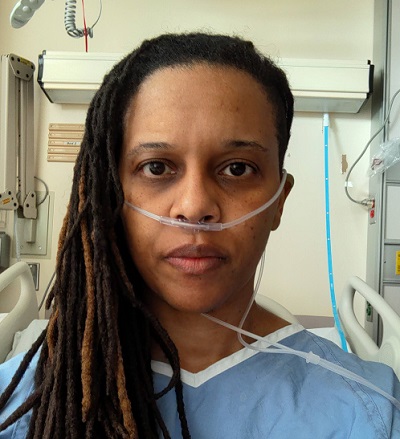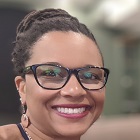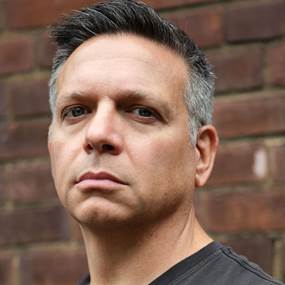
Katherine’s unexpected battle
When life changed in an instant, she refused to give up hope
Chapter 1 “We have some bad news.”
Katherine Isaac, an energetic mother with no prior risk factors, was blindsided by a sudden stroke. She was 45 and her life was completely disrupted. Though her journey started with many challenges, she is now thriving in her recovery.
It was spring, 2021. Before she could be vaccinated, Katherine had fallen ill with COVID-19 and was in the hospital for almost two weeks.
Katherine’s laboured breathing had improved after four scary days in the intensive care unit, where she nearly had to go on a ventilator.
But suddenly: the room started spinning. Katherine could not grip a fork, and her left arm felt strange. Katherine’s healthcare team at the hospital treated her for vertigo.
However, when Katherine could not walk well enough to do a physiotherapy session, hospital staff knew something else was up. Tests, including a CT scan, proved them right.
“We have some bad news,” a doctor told Katherine. “You’ve had a stroke.”
A doctor explained the stroke was caused by a blood clot in the cerebellar section of her brain, likely triggered by COVID-19. “No, I’m Katherine,” she replied, convinced the diagnosis was meant for one of her older roommates in the hospital.
At first, Katherine was shocked and confused by how a stroke could affect someone relatively young and active. She struggled to grasp what having a stroke really meant and what this would mean for her family.
But, as a forward thinker, she quickly refocused on what she needed to do to get better.

In 2021 when the doctor told Katherine that she had a stroke, she struggled to grasp what having a stroke really meant.

Katherine’s dream of going to South Africa fueled her determination to regain mobility.

Katherine’s recovery was driven by the support of her husband, Sheldon, and their two daughters.
Chapter 2 Embracing her new normal
Recovery was different than Katherine expected. At the start, she said, “I treated it like I was recovering from knee surgery or a broken arm. I failed to consider the fact that I have a brain injury and brain damage.” The start of recovery meant new medications, physiotherapy and more tests to confirm if Katherine was at risk of another stroke.
Accepting that she couldn’t do as much as she used to had been a challenge for Katherine.
But today, three years after her stroke, Katherine has embraced this challenge and has adapted to her new way of life.
Katherine has become determined and resourceful, finding clever ways to manage daily activities. She now carries a backpack for errands so both arms are free and rides an electric bike instead of a traditional one. Every now and again Katherine gets the surprise pop-up that reminds her, thinking, “How come I can’t do that anymore?” Like when she goes to pick up a glass of water with her left hand and loses complete control of it. But it doesn’t discourage her or affect her positivity.
Throughout her recovery, Katherine’s husband and daughters, now almost 17 and 15, have taken on more responsibilities. They often accompany her on grocery trips and help her more with household tasks. “They’re more proactive and understand that there are some things that I might not ask for help with, but I’ll probably need the help,” she says.
There are times Katherine wishes her condition was more visible to others, as she no longer uses a cane to walk, but she continues to navigate her new normal with strength and optimism. While Katherine has become more of a homebody throughout her recovery, her resilience and her family’s support have helped her find a new sense of normalcy.
Chapter 3 Forward focus
A major motivator in Katherine’s recovery was a long dreamed-of trip to South Africa. She knew that if she was going to go with her husband and fully enjoy this bucket list adventure that she needed to regain her mobility. Walking ultimately became a lifeline, helping Katherine not only recover physically, but also emotionally, as it helped her to get outside and feel a sense of accomplishment each day.
Katherine’s advice to others recovering from a stroke is to focus on the future, not the present struggles. She encourages looking forward to the improvements a year can bring while building a supportive network of friends, family and support groups.
“What you see today is not what you’re going to be like a year from now,” she says. “Focus on the year from now, look forward.”

Real stories, real impact

These people changed my life

Can your gut help extend life after a heart transplant?
Dr. Jonathan Choy takes an experimental approach to increase heart transplant survival

Loving life while living with heart disease
Three surgeries have changed Suji’s heart, but not her passion for life
